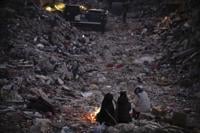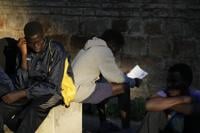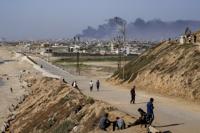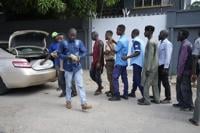ANKARA, Turkey (AP) — One month after a powerful quake devastated parts of Turkey and Syria, hundreds of thousands of people still need adequate shelter and sanitation, and an appeal for $1 billion to assist survivors is only 10% funded, hampering efforts to tackle the humanitarian crisis, a United Nations official said Monday.
The Feb. 6 earthquake and strong aftershocks have killed close to 47,000 people in Turkey, destroyed or damaged around 214,000 buildings and left hundreds of thousands of people homeless — making it the worst disaster in Turkey’s modern history. The U.N. estimates that the earthquake killed around 6,000 people in Syria, mainly in the rebel-held northwest.
Some 2 million survivors have been housed in temporary accommodation or evacuated from the earthquake-devastated region, according to Turkish government figures. Around 1.5 million people have been settled in tents while another 46,000 have been moved to container houses. Others are living in dormitories and guesthouses, the government said.
“Given the number of people that have been that have relocated, given the number of people that have been injured and given the level of the devastation, we do have extensive humanitarian needs now,” Alvaro Rodriguez, the United Nations Resident Coordinator in Turkey, told The Associated Press.
“We have some provinces where up to 25% of the population — we’re talking sometimes half a million people — have relocated. So the challenge we have is how do we provide food, shelter, water for these communities?” he said.
The U.N. representative said tents are still needed even though they are not “the optimal solution” for sheltering people. He reported some cases of scabies outbreaks due to poor sanitary conditions.
Last month, the U.N. made a flash appeal for $397.6 million to help Syrian quake victims and $1 billion appeal for victims in Turkey to cover emergency needs, such as food, protection, education water and shelter, for three months. Rodriguez said the appeal for Turkey is only about 10 percent funded.
“The reality is that if we do not move beyond the roughly 10% that we have, the U.N. and its partners will not be able to meet the humanitarian needs,” he said.
Rodriguez added: “Turkey has been a country that has supported 4 million Syrian refugees over the last few years, and this is an opportunity for the international community to provide the support that Turkey deserves.”
The World Bank has estimated that the earthquake has caused an estimated $34.2 billion in direct physical damages - the equivalent of 4% of Turkey's 2021 GDP. The World Bank said recovery and reconstruction costs will be much higher and that GDP losses associated to economic disruptions will also add to the cost of the earthquakes.
Turkish President Recep Tayyip Erdogan, who faces tough presidential and parliamentary elections in May, has promised to rebuild hundreds of thousands of homes for the quake survivors within a year.
More than 1.74 million refugees lived in the 11 Turkish provinces affected by the earthquakes, according to the U.N. refugee agency. Turkey’s interior minister said 4,267 of the people killed in Turkey were Syrian nationals.
Rodriguez said that around 40,000 Syrians in Turkey have returned home to check on family or economic assets such as land or housing that may have been impacted by the earthquake there.








































